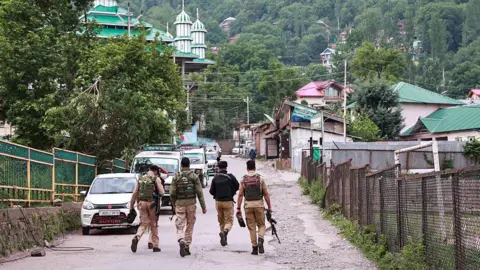Kashmir Terror Attack: Causes, Consequences, and the Road Ahead
The recent Kashmir terror attack has not only shaken the Indian subcontinent but has also sent shockwaves across the international community. Understanding what led to this tragedy, its aftermath, and the global response is crucial for anyone following South Asian geopolitics.

Image: Security forces at a site damaged during the recent events in Kashmir (alt: Scene of Kashmir terror attack with building debris and military personnel)
Overview of the Kashmir Terror Attack
On April 22, 2025, a deadly attack unfolded in the Indian-administered region of Kashmir, targeting a group of tourists. The assault resulted in the tragic loss of 26 lives and left dozens more injured. India's investigation pointed to militants allegedly backed by Pakistan. In response, India launched a series of strikes, claiming to have targeted "terror camps" across the border. Pakistan, for its part, denied involvement and condemned the airstrikes as violations of its sovereignty.
The region of Jammu and Kashmir has long been disputed, with both countries claiming it in full but administering separate parts. For decades, this territory has been a flashpoint for violence, insurgency, and political tension.
Geopolitical Escalation: India-Pakistan Tensions
The Kashmir terror attack dramatically escalated India-Pakistan tensions. In retaliation, India targeted nine sites in Pakistan and Pakistan-administered Kashmir. According to NBC News’s comprehensive report, Pakistan responded with threats of corresponding military action, labeling India’s moves as an "act of war."
Media and diplomatic statements from both countries highlighted measured yet forceful rhetoric. India insisted attacks were focused solely on "terror camps," not civilian or military facilities. Pakistan, however, reported civilian casualties, including the deaths of children, and held emotional funeral prayers attended by national leaders.
For more on the regional military and diplomatic calculus, BBC’s key analysis explores how this escalation differs from past confrontations between the nuclear-armed neighbors.
Societal and Civilian Impact
The conflict's toll extended beyond borders and battlefields. Civilians on both sides were asked to relocate for safety. Schools closed in regions near the Line of Control, disrupting daily life and education. Flights were rerouted or canceled, and authorities in both countries took precautionary security measures.
Funeral services for victims in both countries drew national attention and stoked public emotions. Ordinary families bore the brunt of the violence, reaffirming the devastating human cost of protracted conflict.
Global Responses and Calls for Restraint
International actors, including the United States, United Kingdom, China, Russia, and the European Union, urged both India and Pakistan to exercise restraint. United Nations Secretary-General António Guterres underscored the risks of military escalation between nuclear powers, offering mediation to prevent a broader confrontation.
Turkey and Iran both called for de-escalation and a neutral, transparent investigation into the Kashmir terror attack. The U.S. Embassy in Pakistan advised American citizens to avoid conflict areas or shelter in place.
The Role of Militant Groups
One of the most striking developments was the reported death of ten family members belonging to Maulana Masood Azhar, a leader of the Jaish-e-Mohammed (JeM) militant group believed to have masterminded past attacks. This event was confirmed in a report by The Times of India, underlining JeM’s involvement in ongoing violence and counter-strikes.
What Lies Ahead for Kashmir?
Kashmir remains among the world’s most militarized and volatile regions. Ceasefire violations and periodic escalations keep the prospect of peace elusive. Both India and Pakistan have justified their actions as retaliatory or defensive. Yet, the international community is unanimous in calling for direct dialogue and de-escalation.
As regional stability hangs in the balance, the world watches for diplomatic overtures and prayers that further violence can be averted. The aftermath of the Kashmir terror attack demonstrates the urgency of long-term solutions and the heavy cost borne by civilians.
Conclusion
The Kashmir terror attack was a grim reminder of the unresolved tensions at the heart of South Asia. Its impact—a blend of military, diplomatic, and humanitarian crises—demands attention and empathy. Lasting peace will require not only immediate restraint but also a genuine commitment to dialogue and justice.
Stay informed about future developments and in-depth regional analysis through credible news sources like BBC News and NBC News.